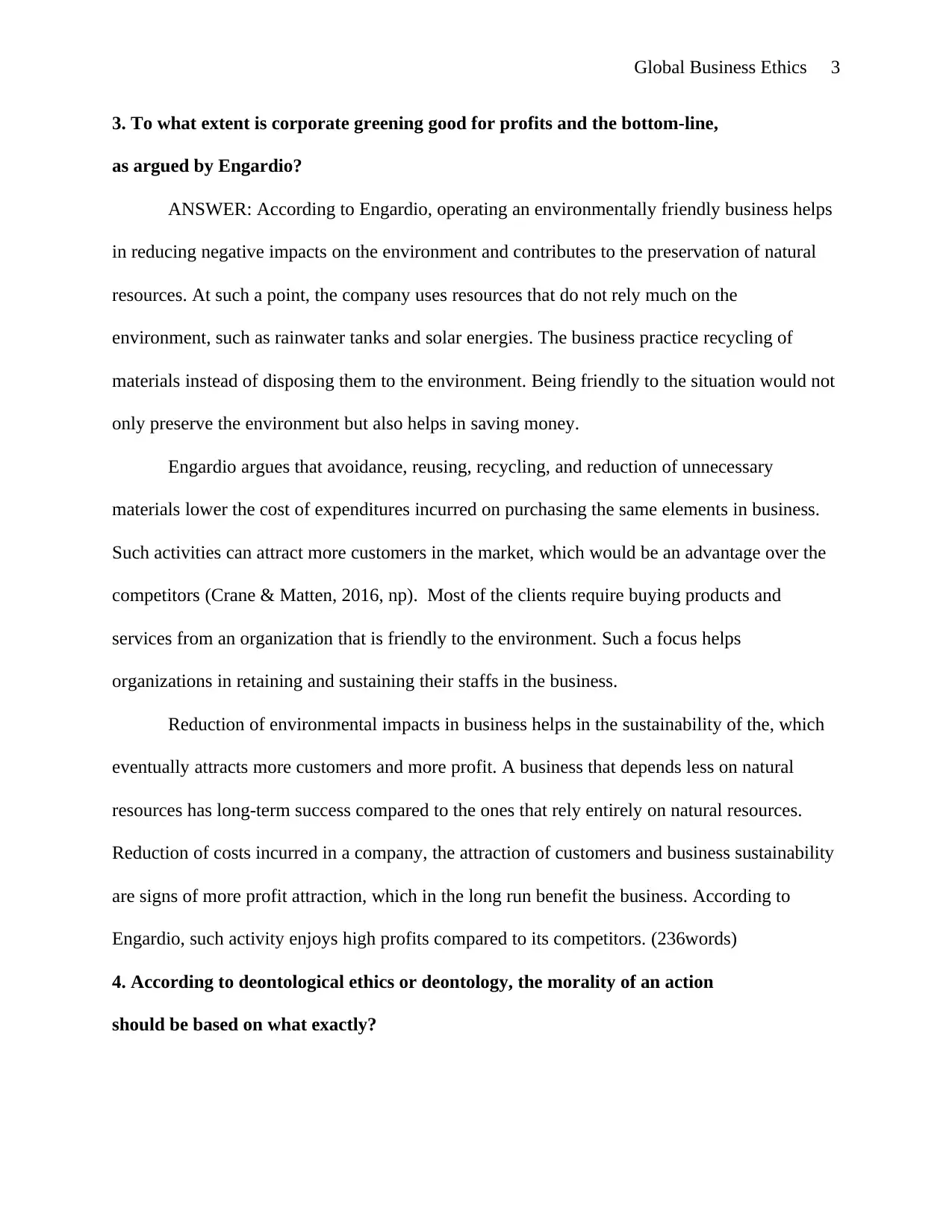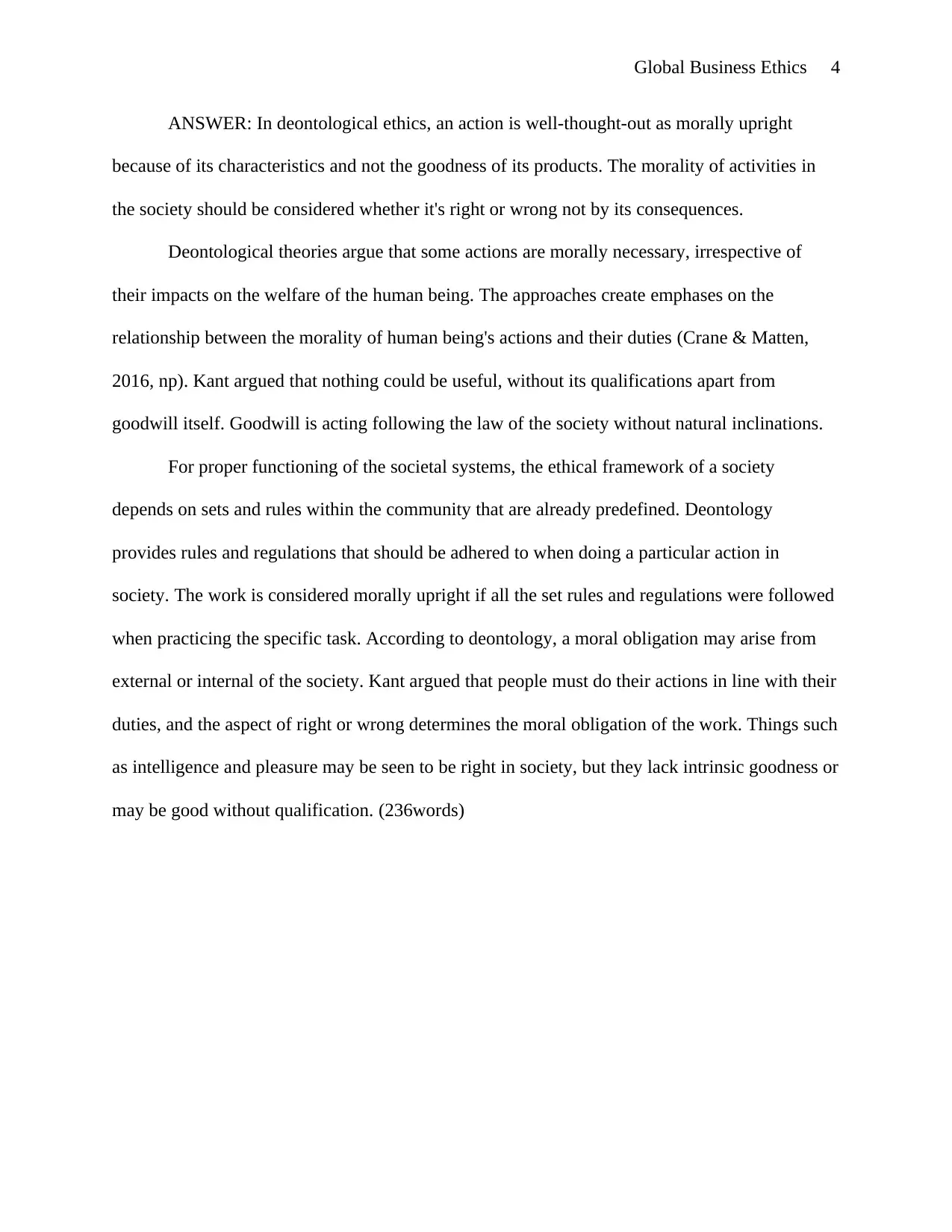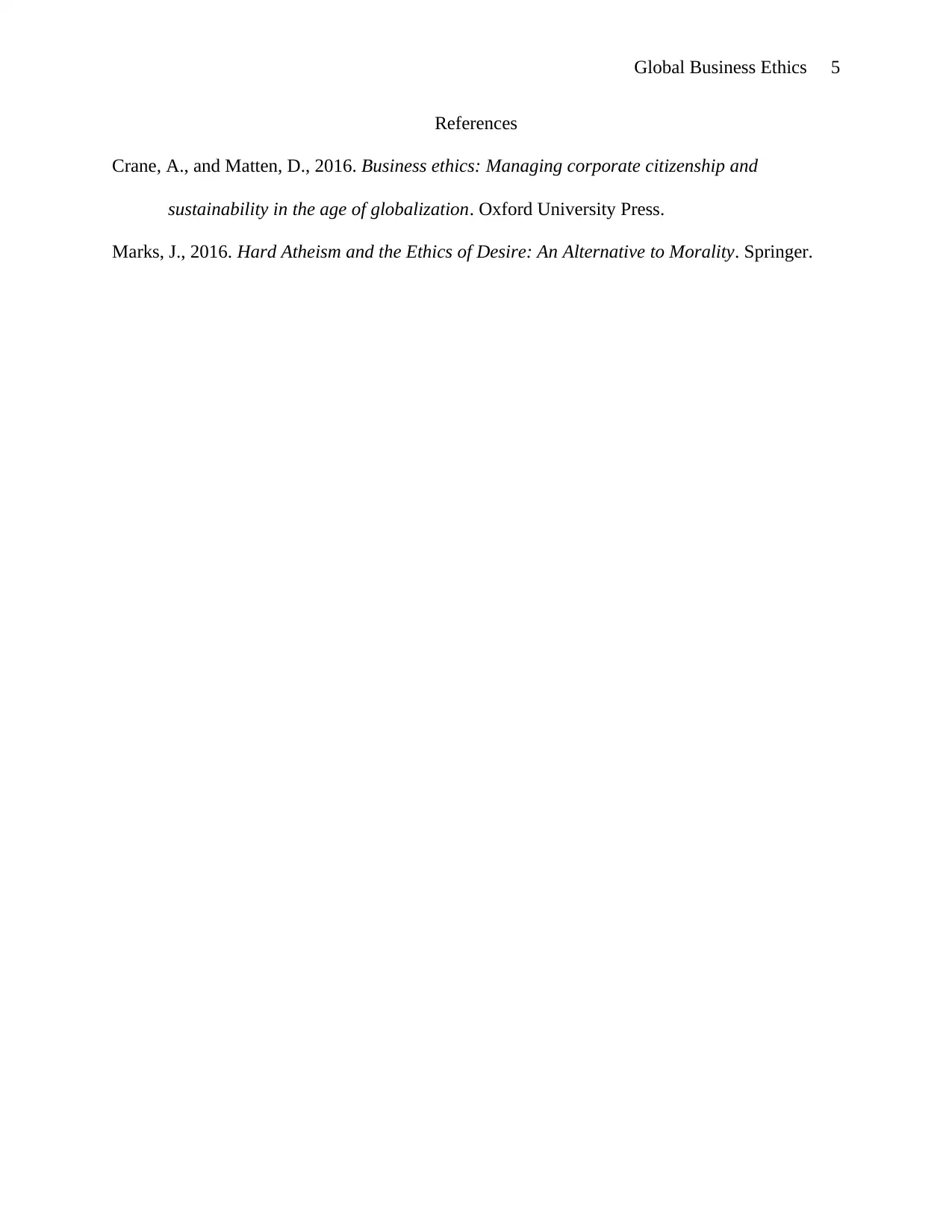GBE 2019: Analyzing Utilitarianism, Deontology, and Corporate Ethics
VerifiedAdded on 2023/04/04
|5
|879
|172
Homework Assignment
AI Summary
This assignment delves into global business ethics, addressing key concepts such as utilitarianism, deontology, and corporate social responsibility. It begins by explaining Joel Marks' illusion argument concerning utilitarianism, highlighting the challenges in achieving moral ethics due to the unknowable consequences of individual actions. The assignment then explores Joel Bakan's view of corporations as psychopathic entities driven by profit maximization and a disregard for societal norms. Furthermore, it discusses Engardio's perspective on the benefits of corporate greening, emphasizing how environmentally friendly practices can lead to cost savings, increased customer attraction, and long-term business sustainability. Finally, the assignment elucidates deontological ethics, focusing on the importance of inherent moral characteristics of actions rather than their consequences, and emphasizing adherence to predefined rules and duties within a society.

GLOBAL BUSINESS ETHICS 1
Global Business Ethics
By [Name]
Institution
Professor
Course
Date
Global Business Ethics
By [Name]
Institution
Professor
Course
Date
Paraphrase This Document
Need a fresh take? Get an instant paraphrase of this document with our AI Paraphraser

Global Business Ethics 2
Global Business Ethics
1. Explain what Joel Marks means by the illusion argument concerning utilitarianism?
ANSWER: Immanuel Kant utilitarianism provisions developed an extended theory about
moral duties that included straight responsibilities to non-human animals. It suggested that the
consequences experienced after the operation determines the morality of an action. Kant argued
that the fundamental aim of ethics is to treat all people. Marks explained that as people try to
develop what is morally right in society, it is impossible to fulfill the morality ethics because
some of the individual actions would go unknown (Marks, 2016, np). Marks argues that Kant's
theory needed proper explanations for it to make sense in the society hence terming it as an
illusion argument. Rightful and moral considerations for the non-humans must be extended for
the Kant's theory to be appreciated. Marks claimed that the consequentialism violated the dignity
of non-human beings. (131words)
2. Why, according to Joel Bakan, are corporations psychopathic?
ANSWER: Bakan argues that corporations are institutional psychopaths and treacherous
owners of power that is over people and the entire society. Their main aim is to capitalize on
profit for their stakeholders. Their ignorance of the methods used to achieve their goals depicts
them like a maniac. Bakan argues that the corporation's psychopathic nature enables them to
manipulate everyone, including the government. He illustrates the corporate psychopathic view
as that of human beings who have no concern for others and are not capable of handling their
relationship with others. They have repeated lies and have no affection for other individuals and
societal members. They fail to adapt and obey the norms and values of society and are not
capable of experiencing guilt over their actions. Bakan argues that the corporation's activities are
not attributed to the qualities of the executive that run them. (140words)
Global Business Ethics
1. Explain what Joel Marks means by the illusion argument concerning utilitarianism?
ANSWER: Immanuel Kant utilitarianism provisions developed an extended theory about
moral duties that included straight responsibilities to non-human animals. It suggested that the
consequences experienced after the operation determines the morality of an action. Kant argued
that the fundamental aim of ethics is to treat all people. Marks explained that as people try to
develop what is morally right in society, it is impossible to fulfill the morality ethics because
some of the individual actions would go unknown (Marks, 2016, np). Marks argues that Kant's
theory needed proper explanations for it to make sense in the society hence terming it as an
illusion argument. Rightful and moral considerations for the non-humans must be extended for
the Kant's theory to be appreciated. Marks claimed that the consequentialism violated the dignity
of non-human beings. (131words)
2. Why, according to Joel Bakan, are corporations psychopathic?
ANSWER: Bakan argues that corporations are institutional psychopaths and treacherous
owners of power that is over people and the entire society. Their main aim is to capitalize on
profit for their stakeholders. Their ignorance of the methods used to achieve their goals depicts
them like a maniac. Bakan argues that the corporation's psychopathic nature enables them to
manipulate everyone, including the government. He illustrates the corporate psychopathic view
as that of human beings who have no concern for others and are not capable of handling their
relationship with others. They have repeated lies and have no affection for other individuals and
societal members. They fail to adapt and obey the norms and values of society and are not
capable of experiencing guilt over their actions. Bakan argues that the corporation's activities are
not attributed to the qualities of the executive that run them. (140words)

Global Business Ethics 3
3. To what extent is corporate greening good for profits and the bottom-line,
as argued by Engardio?
ANSWER: According to Engardio, operating an environmentally friendly business helps
in reducing negative impacts on the environment and contributes to the preservation of natural
resources. At such a point, the company uses resources that do not rely much on the
environment, such as rainwater tanks and solar energies. The business practice recycling of
materials instead of disposing them to the environment. Being friendly to the situation would not
only preserve the environment but also helps in saving money.
Engardio argues that avoidance, reusing, recycling, and reduction of unnecessary
materials lower the cost of expenditures incurred on purchasing the same elements in business.
Such activities can attract more customers in the market, which would be an advantage over the
competitors (Crane & Matten, 2016, np). Most of the clients require buying products and
services from an organization that is friendly to the environment. Such a focus helps
organizations in retaining and sustaining their staffs in the business.
Reduction of environmental impacts in business helps in the sustainability of the, which
eventually attracts more customers and more profit. A business that depends less on natural
resources has long-term success compared to the ones that rely entirely on natural resources.
Reduction of costs incurred in a company, the attraction of customers and business sustainability
are signs of more profit attraction, which in the long run benefit the business. According to
Engardio, such activity enjoys high profits compared to its competitors. (236words)
4. According to deontological ethics or deontology, the morality of an action
should be based on what exactly?
3. To what extent is corporate greening good for profits and the bottom-line,
as argued by Engardio?
ANSWER: According to Engardio, operating an environmentally friendly business helps
in reducing negative impacts on the environment and contributes to the preservation of natural
resources. At such a point, the company uses resources that do not rely much on the
environment, such as rainwater tanks and solar energies. The business practice recycling of
materials instead of disposing them to the environment. Being friendly to the situation would not
only preserve the environment but also helps in saving money.
Engardio argues that avoidance, reusing, recycling, and reduction of unnecessary
materials lower the cost of expenditures incurred on purchasing the same elements in business.
Such activities can attract more customers in the market, which would be an advantage over the
competitors (Crane & Matten, 2016, np). Most of the clients require buying products and
services from an organization that is friendly to the environment. Such a focus helps
organizations in retaining and sustaining their staffs in the business.
Reduction of environmental impacts in business helps in the sustainability of the, which
eventually attracts more customers and more profit. A business that depends less on natural
resources has long-term success compared to the ones that rely entirely on natural resources.
Reduction of costs incurred in a company, the attraction of customers and business sustainability
are signs of more profit attraction, which in the long run benefit the business. According to
Engardio, such activity enjoys high profits compared to its competitors. (236words)
4. According to deontological ethics or deontology, the morality of an action
should be based on what exactly?
⊘ This is a preview!⊘
Do you want full access?
Subscribe today to unlock all pages.

Trusted by 1+ million students worldwide

Global Business Ethics 4
ANSWER: In deontological ethics, an action is well-thought-out as morally upright
because of its characteristics and not the goodness of its products. The morality of activities in
the society should be considered whether it's right or wrong not by its consequences.
Deontological theories argue that some actions are morally necessary, irrespective of
their impacts on the welfare of the human being. The approaches create emphases on the
relationship between the morality of human being's actions and their duties (Crane & Matten,
2016, np). Kant argued that nothing could be useful, without its qualifications apart from
goodwill itself. Goodwill is acting following the law of the society without natural inclinations.
For proper functioning of the societal systems, the ethical framework of a society
depends on sets and rules within the community that are already predefined. Deontology
provides rules and regulations that should be adhered to when doing a particular action in
society. The work is considered morally upright if all the set rules and regulations were followed
when practicing the specific task. According to deontology, a moral obligation may arise from
external or internal of the society. Kant argued that people must do their actions in line with their
duties, and the aspect of right or wrong determines the moral obligation of the work. Things such
as intelligence and pleasure may be seen to be right in society, but they lack intrinsic goodness or
may be good without qualification. (236words)
ANSWER: In deontological ethics, an action is well-thought-out as morally upright
because of its characteristics and not the goodness of its products. The morality of activities in
the society should be considered whether it's right or wrong not by its consequences.
Deontological theories argue that some actions are morally necessary, irrespective of
their impacts on the welfare of the human being. The approaches create emphases on the
relationship between the morality of human being's actions and their duties (Crane & Matten,
2016, np). Kant argued that nothing could be useful, without its qualifications apart from
goodwill itself. Goodwill is acting following the law of the society without natural inclinations.
For proper functioning of the societal systems, the ethical framework of a society
depends on sets and rules within the community that are already predefined. Deontology
provides rules and regulations that should be adhered to when doing a particular action in
society. The work is considered morally upright if all the set rules and regulations were followed
when practicing the specific task. According to deontology, a moral obligation may arise from
external or internal of the society. Kant argued that people must do their actions in line with their
duties, and the aspect of right or wrong determines the moral obligation of the work. Things such
as intelligence and pleasure may be seen to be right in society, but they lack intrinsic goodness or
may be good without qualification. (236words)
Paraphrase This Document
Need a fresh take? Get an instant paraphrase of this document with our AI Paraphraser

Global Business Ethics 5
References
Crane, A., and Matten, D., 2016. Business ethics: Managing corporate citizenship and
sustainability in the age of globalization. Oxford University Press.
Marks, J., 2016. Hard Atheism and the Ethics of Desire: An Alternative to Morality. Springer.
References
Crane, A., and Matten, D., 2016. Business ethics: Managing corporate citizenship and
sustainability in the age of globalization. Oxford University Press.
Marks, J., 2016. Hard Atheism and the Ethics of Desire: An Alternative to Morality. Springer.
1 out of 5
Your All-in-One AI-Powered Toolkit for Academic Success.
+13062052269
info@desklib.com
Available 24*7 on WhatsApp / Email
![[object Object]](/_next/static/media/star-bottom.7253800d.svg)
Unlock your academic potential
Copyright © 2020–2026 A2Z Services. All Rights Reserved. Developed and managed by ZUCOL.

